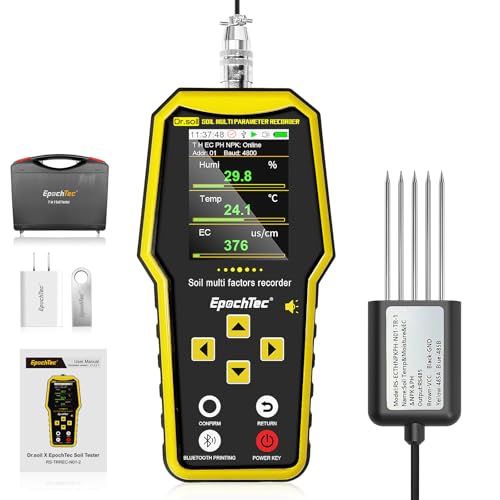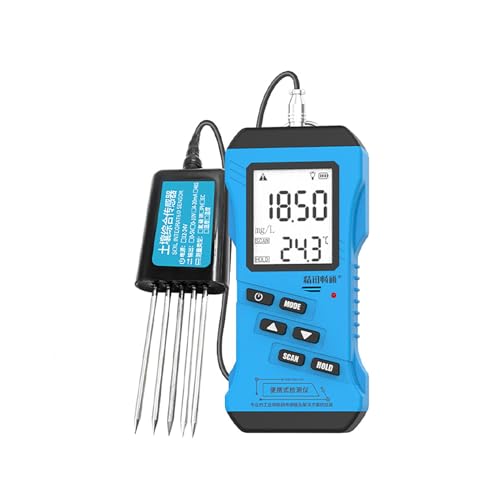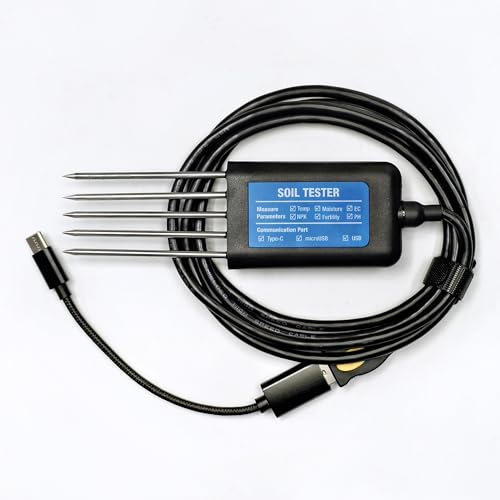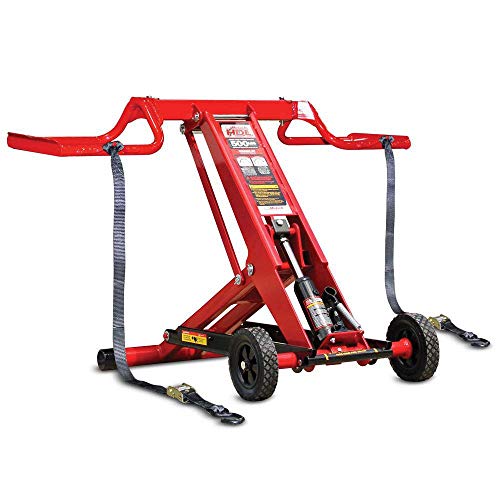Best Npk Test For Soil of 2025: A Complete Comparison
Understanding your soil’s nutrient composition is paramount for thriving gardens and bountiful harvests. Knowing the precise levels of Nitrogen (N), Phosphorus (P), and Potassium (K) – the essential NPK – allows for targeted fertilization, preventing deficiencies and maximizing plant health.
With a vast array of options available, choosing the best best npk test for soil can be overwhelming. Investing in a quality and accurate testing method is crucial, but navigating the market to find the perfect balance of value and reliability is key.
This review aims to guide you through the critical considerations when selecting a soil NPK test, empowering you to make an informed decision for optimal plant growth and a healthier environment. We’ll explore what to look for to ensure you choose the best best npk test for soil for your specific needs.
IN THIS ARTICLE
Top 10 Best Npk Test For Soil Compared

4 in 1 Npk Soil Tester Digital LCD Diaplay 3X AAA🏆 BEST OVERALL
- Measures NPK levels and temperature.
- Backlit LCD screen enhances visibility.
- Simple one-button operation.
- Automatic temperature compensation.
4.3/5
Check Price on Amazon

NPK Soil Test Kit
- Safe and easy to use with non-hazardous reagents.
- Includes all necessary apparatus and clear instructions.
- Laminated color chart aids in result interpretation.
- Meets GLOBE Program standards.
4.7/5
Check Price on Amazon

Rapitest Soil Test Kit for Gardens
- Provides a quick and easy at-home assessment of soil pH, Nitrogen, Phosphorus, and Potash.
- User-friendly capsule system and color comparators simplify the testing process.
- Includes enough materials for 40 tests.
- Comprehensive instructions make it suitable for beginners.
4.3/5
Check Price on Amazon

EpochTec 7 in 1 Soil Tester
- Comprehensive 7-in-1 soil analysis.
- Large, easy-to-read LCD screen with backlight.
- High accuracy due to advanced technology and durable probes.
- Significant data storage capacity with export options.
4.7/5
Check Price on Amazon

CDULOKLB 7 in 1 Soil Tester
- Measures 7 key soil parameters in one device.
- High precision sensors and wide measurement range.
- Backlit LCD screen for easy reading in low light.
- Durable, waterproof, and shock-resistant design.
4.4/5
Check Price on Amazon

MySoil Soil Test Kit
- Accurate measurement of 13 nutrient levels, including Nitrogen and pH.
- Suitable for various soil types and growing conditions.
- Provides custom organic and non-organic fertilizer recommendations.
- Easy-to-follow instructions and prepaid mailing envelope included.
4.3/5
Check Price on Amazon

7 in 1 Soil Tester, Nitrogen
- Measures seven key soil parameters: NPK, pH, moisture, nutrition, and conductivity.
- Digital display with backlight allows for easy reading in various lighting conditions.
- Wide measurement ranges for moisture and temperature.
- Reagent-free testing simplifies the process.
4.7/5
Check Price on Amazon

WXQZHF 4 in 1 Npk Soil Tester
- Measures NPK levels and soil temperature.
- Features a large, backlit LCD screen for easy reading.
- Stainless steel probe for durability and rust resistance.
- Automatic shutdown function to conserve battery.
4.8/5
Check Price on Amazon

7 in 1 Soil Tester with LCD Display
- Measures multiple soil parameters (NPK, pH, temperature, EC, moisture, conductivity).
- Large LCD display for easy reading.
- Data storage and export function to Excel.
- Portable and lightweight design.
4.3/5
Check Price on Amazon

Temperature Moisture EC PH NPK Soil Tester Portabl
- Direct connection to Android phones via Type-C.
- Measures multiple soil parameters: temperature, moisture, EC, pH, and NPK.
- User-friendly Android app for data logging and export.
- Provides real-time readings of soil conditions.
4.7/5
Check Price on Amazon
Detailed Reviews of the Best Best Npk Test For Soil
4 in 1 Npk Soil Tester Digital LCD Diaplay 3X AAA – Measures NPK levels and temperature.

This 4-in-1 soil tester aims to simplify soil analysis for home gardeners. It measures NPK (Nitrogen, Phosphorus, Potassium) levels, as well as temperature. The backlist LCD screen is a welcome addition for easy reading, particularly in varied lighting conditions.
The promise of high measurement accuracy is a key selling point, though independent verification is always recommended. Operation is straightforward with a single button cycling through the NPK data. Automatic temperature compensation is also included which should improve the accuracy of measurements across different environmental conditions.
Powered by 3 AAA batteries (not included), it is designed for convenience and portability within a garden setting. The device’s focus on NPK and temperature offers a basic, entry-level solution for monitoring soil health.
Pros
- Measures NPK levels and temperature.
- Backlit LCD screen enhances visibility.
- Simple one-button operation.
- Automatic temperature compensation.
- Portable and battery-powered.
Cons
- Accuracy may need independent verification.
- Requires 3 AAA batteries (not included).
NPK Soil Test Kit – Safe and easy to use with non-hazardous reagents.

This N-P-K Soil Test Kit offers a straightforward and relatively safe method for assessing the levels of nitrogen, phosphorus, and potassium in soil samples. The inclusion of non-hazardous TesTabs is a definite plus, making it suitable for educational settings and home use where safety is a concern. The kit provides all the necessary equipment and clearly illustrated instructions, simplifying the testing process, even for beginners.
The laminated color chart is a useful addition for interpreting the results. Meeting GLOBE Program standards suggests a degree of accuracy and reliability. However, it’s important to note that this kit exclusively tests for N-P-K and does not include a soil pH test, which is a limitation for those seeking a comprehensive soil analysis.
Pros
- Safe and easy to use with non-hazardous reagents.
- Includes all necessary apparatus and clear instructions.
- Laminated color chart aids in result interpretation.
- Meets GLOBE Program standards.
Cons
- Does not include a soil pH test.
- Only tests for N-P-K; lacks a full range of soil nutrient analyses.
Rapitest Soil Test Kit for Gardens – Provides a quick and easy at-home assessment of soil pH, Nitrogen, Phosphorus, and Potash.

The Soil Test Kit offers a relatively quick and easy way to assess key nutrient levels in your soil, specifically pH, Nitrogen, Phosphorus, and Potash. The capsule system and color comparators are designed for straightforward use, even for those new to soil testing. The kit includes enough materials for 40 tests (10 of each type), making it suitable for multiple garden beds or ongoing monitoring.
The included instructions are clear and comprehensive, and the soil pH preference list for a wide variety of plants is a valuable addition. Overall, this kit provides a decent overview of your soil’s health, although the accuracy may not match professional laboratory results.
Pros
- Provides a quick and easy at-home assessment of soil pH, Nitrogen, Phosphorus, and Potash.
- User-friendly capsule system and color comparators simplify the testing process.
- Includes enough materials for 40 tests.
- Comprehensive instructions make it suitable for beginners.
- Valuable soil pH preference list for over 450 plants included.
Cons
- Accuracy may not be comparable to professional laboratory testing.
- Color interpretation can be subjective.
EpochTec 7 in 1 Soil Tester – Comprehensive 7-in-1 soil analysis.

This 7-in-1 soil tester aims to provide comprehensive soil analysis with its ability to measure pH, moisture, temperature, EC, and NPK levels. The large LCD screen and multi-function buttons make operation straightforward, and the backlight is a helpful addition for low-light conditions. The device boasts a high level of accuracy due to its advanced technology and robust probes, though independent verification is always recommended.
A notable feature is its substantial data storage capacity, allowing for tracking trends over time and exporting data for in-depth analysis. The long standby time, thanks to the rechargeable battery, is convenient. The automatic alarm feature for various parameters is a nice touch for users needing to monitor specific conditions.
Pros
- Comprehensive 7-in-1 soil analysis.
- Large, easy-to-read LCD screen with backlight.
- High accuracy due to advanced technology and durable probes.
- Significant data storage capacity with export options.
- Long battery life with rechargeable battery.
- Automatic alarm feature for customized monitoring.
Cons
- Accuracy claims require independent verification for critical applications.
- Relatively high price point compared to basic soil testers.
CDULOKLB 7 in 1 Soil Tester – Measures 7 key soil parameters in one device.

The 7-in-1 Multifunctional Soil Analyzer aims to provide comprehensive soil analysis in a single device, measuring pH, moisture, temperature, and NPK levels. It boasts high precision sensors and a wide measurement range, catering to various gardening and agricultural needs. The backlit LCD screen with adjustable brightness enhances visibility in low-light conditions.
The device is designed with durability in mind, featuring a waterproof, dustproof, and shock-resistant housing suitable for outdoor use. Powered by readily available AAA batteries, it ensures portability for field applications. While the device offers a wide array of functionalities, potential users should be aware of battery life and the accuracy of NPK measurements in different soil types.
Pros
- Measures 7 key soil parameters in one device.
- High precision sensors and wide measurement range.
- Backlit LCD screen for easy reading in low light.
- Durable, waterproof, and shock-resistant design.
- Portable and powered by AAA batteries.
- Provides comprehensive soil analysis for informed gardening.
Cons
- Battery life not explicitly stated and may require frequent replacement with heavy use.
- Accuracy of NPK measurements may vary depending on the soil type and environmental factors.
MySoil Soil Test Kit – Accurate measurement of 13 nutrient levels, including Nitrogen and pH.

This soil test kit offers a comprehensive analysis of soil nutrients, providing a more accurate assessment than typical at-home pH meters and test strips. The kit is designed for various growing scenarios, from lawns to hydroponics. It analyzes 13 plant-available nutrient levels, including Nitrogen and pH, and delivers results within 6-8 days.
The inclusion of custom fertilizer recommendations, both organic and non-organic, is a significant benefit. The kit contains everything needed for sampling and mailing, and comes with customer support. While the turnaround time for results is reasonable, users should be aware that it’s not instant.
Overall, this kit seems like a valuable tool for optimizing plant health through informed soil management.
Pros
- Accurate measurement of 13 nutrient levels, including Nitrogen and pH.
- Suitable for various soil types and growing conditions.
- Provides custom organic and non-organic fertilizer recommendations.
- Easy-to-follow instructions and prepaid mailing envelope included.
- Offers dedicated customer support.
Cons
- Results take 6-8 days to receive.
- It is a single-use kit.
7 in 1 Soil Tester, Nitrogen – Measures seven key soil parameters: NPK, pH, moisture, nutrition, and conductivity.

The 7-in-1 Soil Tester aims to provide a comprehensive analysis of soil conditions, measuring nitrogen, phosphorus, potassium (N/P/K), pH, moisture, nutrition, and conductivity. It utilizes a digital display with a backlight for easy reading, even in dimly lit environments. The device boasts a wide measurement range for both moisture and temperature.
Its reagent-free testing method simplifies the process. The product is constructed from high-strength composite plastic, suggesting durability. While the tester offers multiple data points to inform soil management decisions, the accuracy and reliability of these measurements in real-world conditions would need further validation.
Overall, it appears to be a helpful tool for gardeners and farmers seeking to improve soil quality.
Pros
- Measures seven key soil parameters: NPK, pH, moisture, nutrition, and conductivity.
- Digital display with backlight allows for easy reading in various lighting conditions.
- Wide measurement ranges for moisture and temperature.
- Reagent-free testing simplifies the process.
- Durable construction with high-strength composite plastic.
Cons
- Accuracy and long-term reliability may require further validation in diverse soil types.
- The description mentions “nutrition” which is not a standard scientific measurement. Clarity on what parameter is actually measured would be beneficial.
WXQZHF 4 in 1 Npk Soil Tester – Measures NPK levels and soil temperature.

This 4-in-1 soil tester aims to provide comprehensive soil analysis by measuring nitrogen, phosphorus, potassium (N-P-K) levels, and temperature. The device boasts lab-grade accuracy and speed with its N-P-K measurements ranging from 0-1999 mg/kg and temperature measurements from 0℃-60℃/32℉-140℉, both with ±1% accuracy. It features a large LCD screen with backlight for clear readability, even in low light conditions.
The stainless steel probe is designed for durability and resistance to rust and bending, suitable for long-term use in various soil types, both indoors and outdoors. The device includes an automatic 30-second shutdown function to conserve battery. Intended for home gardens, farms, and potted plants, it aims to assist both gardening enthusiasts and professionals in maintaining optimal growing conditions.
Pros
- Measures NPK levels and soil temperature.
- Features a large, backlit LCD screen for easy reading.
- Stainless steel probe for durability and rust resistance.
- Automatic shutdown function to conserve battery.
- Claims lab-grade accuracy.
Cons
- Accuracy claims should be verified with independent testing.
- Limited to NPK and temperature – does not measure pH or moisture.
7 in 1 Soil Tester with LCD Display – Measures multiple soil parameters (NPK, pH, temperature, EC, moisture, conductivity).

The 7-in-1 Soil Tester offers a comprehensive solution for monitoring soil health by measuring nitrogen, phosphorus, potassium (NPK), pH, temperature, conductivity, moisture, and EC. The large LCD display enhances usability, making it accessible for users of varying experience levels. The device boasts a data storage function capable of storing up to 100W of data, which can then be exported to a computer for further analysis via Excel.
The manufacturer emphasizes the system’s high stability and reliability, with reported operational reliability exceeding 99.7%. Its portable design makes it suitable for fieldwork across diverse industries, including agriculture, environmental monitoring, and mining. While potentially beneficial for detailed soil analysis, independent verification of the claimed accuracy and long-term durability is recommended.
Pros
- Measures multiple soil parameters (NPK, pH, temperature, EC, moisture, conductivity).
- Large LCD display for easy reading.
- Data storage and export function to Excel.
- Portable and lightweight design.
- Potentially high reliability based on manufacturer claims.
Cons
- Accuracy claims need independent verification.
- Long-term durability is unknown.
Temperature Moisture EC PH NPK Soil Tester Portabl – Direct connection to Android phones via Type-C.

This soil sensor offers a convenient way to monitor key soil parameters directly from your Android smartphone via a Type-C connection. The device measures soil temperature, moisture, electrical conductivity (EC), pH, and NPK levels (Nitrogen, Phosphorus, Potassium). The accompanying Android app allows for easy data logging and the option to export the data for further analysis.
The app connectivity is straightforward, and the real-time readings provide a snapshot of your soil conditions. However, the accuracy of the readings, particularly for NPK, might require cross-validation with other testing methods. The durability of the sensor in varied soil types and long-term use remains to be seen.
Pros
- Direct connection to Android phones via Type-C.
- Measures multiple soil parameters: temperature, moisture, EC, pH, and NPK.
- User-friendly Android app for data logging and export.
- Provides real-time readings of soil conditions.
Cons
- Accuracy of NPK readings may require independent verification.
- Long-term durability in various soil conditions is unknown.
Buying Guide: What to Look For in a Best Npk Test For Soil
Understanding Your Soil Needs
Before diving into the world of NPK soil tests, it’s crucial to understand why you need to test your soil in the first place. Different plants have varying nutrient requirements. Knowing the Nitrogen (N), Phosphorus (P), and Potassium (K) levels in your soil allows you to tailor your fertilization strategies for optimal plant growth. Consider factors like the type of plants you’re growing, the soil type, and any visible signs of nutrient deficiencies (e.g., yellowing leaves, stunted growth). Identifying these factors will guide your selection of the best NPK test for soil.
Types of NPK Soil Tests
There are generally two main types of NPK soil tests: chemical test kits and digital meters. Chemical test kits involve mixing soil samples with reagents and comparing the resulting colors to a chart to estimate NPK levels. These are typically more affordable. Digital meters use sensors to measure NPK levels directly. These are generally more accurate and offer more detailed readings but come at a higher price. Choosing the right type depends on your budget, desired accuracy, and frequency of testing. Consider if you need to only test NPK or other soil parameters.
Key Features to Consider
When choosing the best NPK test for soil, several features are important. For chemical kits, look for clear instructions, non-hazardous reagents, and a laminated color chart for easy interpretation. For digital meters, consider the accuracy, ease of use (one-button operation), screen visibility (backlit LCD), durability (waterproof), and battery life. Also, consider if the meter measures other parameters such as pH, moisture, or temperature. A good NPK soil test provides reliable data you can use with confidence.
Accuracy and Reliability
Accuracy is paramount when selecting any soil test. Research the reliability of the brand and read user reviews to get an idea of the test’s performance in real-world conditions. Digital meters with advanced technology and durable probes often provide more accurate readings. Chemical kits’ accuracy can be influenced by user technique and the quality of the reagents. Ensure the kit meets relevant standards (e.g., GLOBE Program). A reliable NPK soil test is essential for making informed decisions about soil amendments and fertilization.
Cost and Value
The cost of NPK soil tests can vary significantly, from inexpensive chemical kits to more expensive digital meters. Consider the long-term value of the test in terms of improved plant health and reduced fertilizer costs. A more expensive meter might be a worthwhile investment if you plan to test your soil frequently and need accurate results. Chemical kits are a good option for occasional testing or for gardeners on a budget. Weigh the initial cost against the potential benefits to determine the best NPK test for your needs.
Frequently Asked Questions about Best Npk Test For Soil
What is NPK and why is it important for soil testing?
NPK stands for Nitrogen (N), Phosphorus (P), and Potassium (K), which are the three macronutrients essential for plant growth. Nitrogen promotes leafy growth, phosphorus supports root development and flowering, and potassium contributes to overall plant health and disease resistance. Testing NPK levels in soil is crucial because it helps determine if the soil has enough of these nutrients to support healthy plant growth. Understanding the NPK balance allows gardeners to adjust their fertilization strategies, prevent nutrient deficiencies, and optimize yields. The best NPK test provides accurate readings.
How often should I test my soil for NPK levels?
The frequency of soil testing depends on several factors, including the type of plants you’re growing, the soil type, and the amount of fertilizer you use. Generally, it’s recommended to test your soil at least once a year, preferably in the spring or fall before planting. If you’re growing heavy feeders like tomatoes or corn, you may need to test more frequently, such as every few months. Also, testing after heavy rainfall can help determine if nutrients have been leached from the soil. Regular testing ensures you maintain optimal NPK levels for healthy plant growth.
What are the signs of NPK deficiencies in plants?
NPK deficiencies can manifest in various ways, depending on the specific nutrient that’s lacking. Nitrogen deficiency often results in yellowing of older leaves, stunted growth, and pale green foliage. Phosphorus deficiency can cause stunted growth, dark green or purplish leaves, and poor root development. Potassium deficiency may lead to yellowing or browning of leaf edges, weak stems, and reduced fruit or flower production. Recognizing these signs can help you identify nutrient imbalances and take corrective action by using the best NPK test.
Are digital NPK soil testers more accurate than chemical test kits?
In general, digital NPK soil testers tend to be more accurate than chemical test kits. Digital meters use sensors to directly measure NPK levels, providing more precise readings. Chemical test kits rely on visual comparison of colors, which can be subjective and prone to error. However, the accuracy of digital meters can vary depending on the quality of the sensors and the calibration of the device. Look for meters with advanced technology and durable probes for the most accurate results. The best NPK test provides reliable data.
Can I use an NPK soil test to determine the pH of my soil?
Some NPK soil tests also include the ability to measure soil pH, but not all. If you’re interested in testing both NPK levels and pH, look for a test kit or meter that specifically includes pH measurement. pH is another crucial factor affecting plant growth, as it influences the availability of nutrients in the soil. A pH range of 6.0 to 7.0 is generally considered optimal for most plants. Testing both NPK and pH provides a more comprehensive assessment of soil health. The best NPK test may include pH testing.
What is EC and why is it important to measure in soil?
EC stands for Electrical Conductivity, and it measures the amount of salts in the soil. High EC levels can indicate excessive fertilization or the presence of harmful salts, which can inhibit plant growth. Low EC levels may indicate a lack of nutrients. Measuring EC along with NPK levels can provide a more complete picture of soil health and help you make informed decisions about fertilization and irrigation. Some advanced soil testers include EC measurement as part of their comprehensive analysis.
How do I interpret the results of an NPK soil test?
NPK soil tests typically provide results in parts per million (ppm) or pounds per acre. The ideal NPK levels vary depending on the type of plants you’re growing. Consult a soil fertility guide or your local extension office for recommended NPK ranges for your specific plants. Generally, a balanced NPK ratio is desirable, but some plants may require higher levels of certain nutrients. Use the test results to adjust your fertilization strategies and ensure your plants receive the nutrients they need.
What are some common soil amendments to correct NPK imbalances?
If your soil test reveals NPK imbalances, you can use various soil amendments to correct them. For nitrogen deficiency, consider adding composted manure, blood meal, or nitrogen-rich fertilizers. For phosphorus deficiency, bone meal or rock phosphate can be effective. Potassium deficiency can be addressed with potassium sulfate or wood ash. Always follow the instructions on the amendment packaging and avoid over-fertilizing, which can harm plants and pollute the environment. The best NPK test helps guide amendment choices.
Are there organic options for correcting NPK deficiencies?
Yes, there are several organic options for correcting NPK deficiencies. Compost is a great all-around soil amendment that can improve NPK levels and overall soil health. Composted manure is a good source of nitrogen, while bone meal provides phosphorus, and wood ash contains potassium. Green manure crops, such as legumes, can also be used to fix nitrogen in the soil. Organic fertilizers are generally slower-releasing than synthetic fertilizers, providing a more gradual and sustained nutrient supply.
Can I use an NPK soil test to determine the overall health of my soil?
While an NPK soil test provides valuable information about nutrient levels, it doesn’t tell the whole story of soil health. Other factors, such as soil structure, organic matter content, microbial activity, and the presence of contaminants, also play a significant role. For a more comprehensive assessment of soil health, consider conducting additional tests or consulting with a soil specialist. However, a good NPK soil test is a crucial first step in understanding your soil’s nutritional status.
Conclusion: The Final Verdict
The 4 in 1 Npk Soil Tester Digital LCD Diaplay 3X AAA this soil tester offers a convenient and relatively affordable way to gauge basic soil health. while professional lab tests remain the gold standard for precision, this device can be a useful tool for home gardeners seeking a quick and easy npk assessment.


